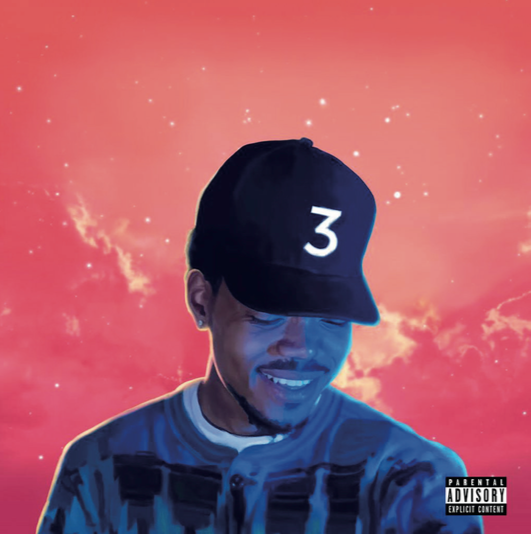By Martin Castro (The Cascade) – Email

In early 2011, 18-year-old Chancellor Bennett was given two weeks’ suspension from his Chicago high school after being caught with marijuana on the school’s property. Two weeks later he’d written the majority of his debut mixtape, the soul-and-jazz-influenced 10 Day. Almost exactly a year later, Chance released Acid Rap, once more as a free mixtape.
There was a time when I actively avoided rap, a time when I could confidently say it was my least favourite genre of music. And then I listened to Acid Rap. The first 40 seconds of “Good Ass Intro” sold me on Chance. The choir vocals in the background, the bouncy and infectious organ, the relentlessly cheerful energy of the track all just work so well. By the time I got to Noname Gypsy’s verse on “Lost,” four tracks later, I was sold.
While I loved Donnie Trumpet’s (Nico Segal) Surf and its more enthusiastic embrace of jazz and soul aesthetics, Chance made it clear that Surf was not Acid Rap’s successor. That third mixtape, referred to as “Chance 3” since it hadn’t been named — nor was it, until the day it appeared online, again for free, as Coloring Book — would come later.
The lyricism and instrumental aesthetic on Coloring Book is a stark contrast to Acid Rap’s. While Acid Rap was somewhat depressive in its lyrical content (“Why’s God’s phone die every time that I call on Him? If his son had a Twitter wonder if I would follow him”), Coloring Book is positive as hell.
The question of why Coloring Book is so positive is answered right out of the gate: “Man my daughter couldn’t have a better mother / If she ever find another, he better love her / Man I swear my life is perfect, I could merch it / If I die I’ll probably cry at my own service.”
Chance is outright ecstatic throughout most of Coloring Book. And the religious aesthetic is carried on by the choir that provides backing vocals for just about every track, as well as the lyrical content. On Coloring Book, Chance The Rapper did something I didn’t think I’d ever see anyone do — he made a gospel album, then marketed it and released it as a hip-hop album.
“Blessings,” which makes absolutely no attempt to hide its gospel-ness, is a perfect synthesis of the witty, razor-sharp lyricist cracking wise on AcidRap and the rapper / father / sermon leader we’ve been introduced to on this record. “I talked to his daddy, said you the man of the house now look out for your family, he has ordered my steps, gave me a sword with a crest, and gave Donnie a trumpet in case I get shortness of breath.” Although its positivity can get predictable, Coloring Book is as impressive and witty lyrically as its predecessors, and more ambitious in its attempt to diversify, song by song, the genre-specific influences it draws on and emulates. “No Problem” incorporates gospel and funk, for example. And “Mixtape” emulates the trap-influenced content of more mainstream artists like Future and Young Thug (both of whom appear on Coloring Book).
For an artist who’s not signed to a label, and a project that got released free of charge, Coloring Book has a staggering number of high-profile features (Kanye West is on the first track, Lil Wayne is on the second), the most impressive of which is Jay Electronica’s verse on “How Great,” a track that’s dropped every intention of trying to appear as if it’s not a worship song, and instead embraced it, making for a sweet little joyous addition at the tail end of the record.
Tracks like “All Night” and “Angels” (the latter of which Chance kicks off by singing / yelling, “I got my city doing front flips! When every father-rapper-mayor jumped ship”) are less reflective of the gospel aesthetic apparent throughout Coloring Book, and more of a bursting-at-the-seams, in-the-moment enthusiasm that grounds the record in an admittedly simple, yet equally appealing sentiment.
Is Coloring Book as thematically complex as AcidRap? No. But only because it’s so overwhelmingly positive in its outlook that it foregoes complexity and instead opts for unapologetic enthusiasm.
Coloring Book was as satisfying a record as I had hoped for, but for listeners still unconvinced, as a way of explaining its intensely energetic yet narrow-scoped content, I’d argue that this isn’t a record by Chance the Rapper, or even Chance the Preacher. It’s a record by Chance the Father.

